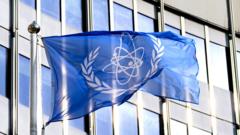**A landmark resolution highlights Iran's failure to cooperate with international nuclear regulators, raising fears of a weapons-capable program.**
**International Atomic Energy Agency Sound Alarm on Iran’s Nuclear Compliance**

**International Atomic Energy Agency Sound Alarm on Iran’s Nuclear Compliance**
**IAEA declares Iran in breach of nuclear obligations as tensions escalate over enrichment activities.**
In a significant move, the International Atomic Energy Agency (IAEA) has officially declared Iran in breach of its nuclear non-proliferation obligations, marking the first time such a declaration has been made in two decades. This resolution received support from 19 of the 35 member countries present at the IAEA's governing board meeting, with backing from the United States, the United Kingdom, France, and Germany. The IAEA's criticism centers on Iran's inadequate responses concerning its undeclared nuclear materials and activities, which it considers a violation of compliance obligations.
Iran has responded vehemently, denouncing the resolution as politically motivated and announcing its intention to establish a new enrichment facility. This comes in the wake of an IAEA report noting Iran maintains a stockpile of uranium enriched to 60% purity, which is perilously close to weapons-grade levels, potentially sufficient for constructing nine nuclear bombs. While Iran maintains its nuclear program is intended solely for peaceful purposes, the recent findings raise serious international concerns.
Since the U.S. withdrew from the 2015 nuclear agreement under President Trump and reimposed sanctions, Iran has progressively disregarded key restrictions, notably those related to uranium enrichment. The latest IAEA resolution underscores this non-compliance and expresses regret over Iran's failure to engage fully with the agency.
Amidst a backdrop of increasing geopolitical tension, particularly in the Middle East, responses to the resolution vary. While three countries voted against it, a group of European powers has urged Iran to seize the opportunity to comply with its obligations. In retaliation, Iran has announced plans to enhance its uranium enrichment capabilities, which is expected to complicate ongoing negotiations for a new nuclear deal.
As diplomatic talks resume, the situation remains precarious, with fears of military escalation looming, especially following recent threats by Iranian officials concerning possible responses to an attack, including targeting U.S. military bases. Analysts suggest the international community will need to closely monitor Iran's moves to avert further escalation.
Iran has responded vehemently, denouncing the resolution as politically motivated and announcing its intention to establish a new enrichment facility. This comes in the wake of an IAEA report noting Iran maintains a stockpile of uranium enriched to 60% purity, which is perilously close to weapons-grade levels, potentially sufficient for constructing nine nuclear bombs. While Iran maintains its nuclear program is intended solely for peaceful purposes, the recent findings raise serious international concerns.
Since the U.S. withdrew from the 2015 nuclear agreement under President Trump and reimposed sanctions, Iran has progressively disregarded key restrictions, notably those related to uranium enrichment. The latest IAEA resolution underscores this non-compliance and expresses regret over Iran's failure to engage fully with the agency.
Amidst a backdrop of increasing geopolitical tension, particularly in the Middle East, responses to the resolution vary. While three countries voted against it, a group of European powers has urged Iran to seize the opportunity to comply with its obligations. In retaliation, Iran has announced plans to enhance its uranium enrichment capabilities, which is expected to complicate ongoing negotiations for a new nuclear deal.
As diplomatic talks resume, the situation remains precarious, with fears of military escalation looming, especially following recent threats by Iranian officials concerning possible responses to an attack, including targeting U.S. military bases. Analysts suggest the international community will need to closely monitor Iran's moves to avert further escalation.





















